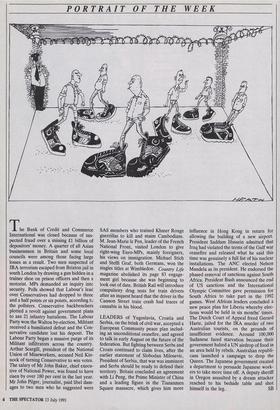PORTRAIT OF THE WEEK
The Bank of Credit and Commerce International was closed because of sus- pected fraud over a missing i1 billion of depositors' money. A quarter of all Asian businessmen in Britain and some local councils were among those facing large losses as a result. Two men suspected of IRA terrorism escaped from Brixton jail in south London by drawing a gun hidden in a trainer shoe on prison officers and then a motorist. MPs demanded an inquiry into security. Polls showed that Labour's lead over Conservatives had dropped to three and a half points or six points, according to the pollsters. Conservative backbenchers plotted a revolt against government plans to axe 21 infantry battalions. The Labour Party won the Walton by-election, Militant received a humiliated defeat and the Con- servative candidate lost his deposit. The Labour Party began a massive purge of its Militant infiltrators across the country. Arthur Scargill, president of the National Union of Mineworkers, accused Neil Kin- nock of turning Conservative to win votes. The salary of Mr John Baker, chief execu- tive of National Power, was found to have risen by over 180 per cent in the last year. Mr John Pilger, journalist, paid libel dam- ages to two men who he suggested were SAS members who trained Khmer Rouge guerrillas to kill and maim Cambodians. M. Jean-Marie le Pen, leader of the French National Front, visited London to give right-wing Euro-MPs, mainly foreigners, his views on immigration. Michael Stich and Steffi Graf, both Germans, won the singles titles at Wimbledon. Country Life magazine abolished its page 83 engage- ment girl because she was beginning to look out of date. British Rail will introduce compulsory drug tests for train drivers after an inquest heard that the driver in the Cannon Street train crash had traces of cannabis in his blood.
LEADERS of Yugoslavia, Croatia and Serbia, on the brink of civil war, accepted a European Community peace plan includ- ing an unconditional ceasefire, and agreed to talk in early August on the future of the federation. But fighting between Serbs and Croats continued to claim lives, after the earlier statement of Slobodan Milosevic, President of Serbia, that war was imminent and Serbs should be ready to defend their territory. Britain concluded an agreement with Li Peng, the Prime Minister of China and a leading figure in the Tiananmen Square massacre, which gives him more influence in Hong Kong in return for allowing the building of a new airport. President Saddam Hussein admitted that Iraq had violated the terms of the Gulf war ceasefire and released what he said this time was genuinely a full list of his nuclear installations. The ANC elected Nelson Mandela as its president. He endorsed the phased removal of sanctions against South Africa. President Bush announced the end of US sanctions and the International Olympic Committee gave permission for South Africa to take part in the 1992 games. West African leaders concluded a new peace plan for Liberia whereby elec- tions would be held in six months' times. The Dutch Court of Appeal freed Gerard Harte, jailed for the IRA murder of two Australian tourists, on the grounds of insufficient evidence. Around 100,000 Sudanese faced starvation because their government halted a UN airdrop of food in an area held by rebels. Australian republi- cans launched a campaign to drop the Queen. The Japanese government created a department to persuade Japanese work- ers to take more time off. A deputy sheriff in Oregon assaulted by a dream attacker reached to his bedside table and shot


















































 Previous page
Previous page